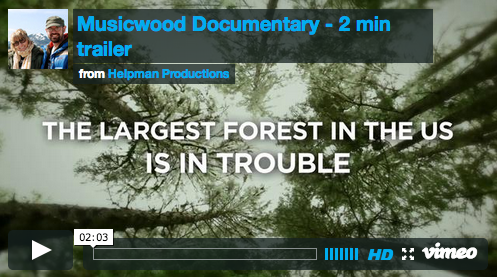[pullquote]Earth’s guitars are an endangered species[/pullquote]
“Forests are not quiet. There’s music in the forest,” says a man in the opening lines of the film. “When you cut down the spruce tree and make it into a thousand guitars, all that means is that a spruce tree is singing in a thousand different places.”
‘Musicwood,’ a 2012 documentary directed by Maxine Trump and screened at Chicago’s CIMMfest last weekend, is part environmental activism and part celebration of a great American forest and great American acoustic guitars. Through breathtaking aerial footage of Alaskan forests and interviews with musicians like Steve Earle and Yo La Tengo, the film draws a connection between musicians and the ancient forests their instruments are made of.
The musicians quickly become sidelined, though, by ‘Musicwood’s’ chronicle of an effort by Greenpeace to slow the clearcutting of the Tongass, the largest national forest in the United States and the source of Sitka Spruce used in guitar manufacture. Though most of the wood from Tongass trees is used in overseas construction, Greenpeace organizes guitar makers like Gibson, C.F. Martin and Taylor into the Music Wood Coalition. The heads of the companies explore the forest and mingle with the leaders of Sealaska, the Native American-owned corporation logging in the Tongass. Representatives of Sealaska, in turn, visit the guitar factories.
“There’s a lot of points of view in the film,” says Trump, “I wanted to be very level in the filmmaking, and give everybody a voice.”
‘Musicwood’ is the first documentary for Trump, who has a background in BBC television. Trump, who is not affiliated with Greenpeace, says she was drawn to the Music Wood story because of the fresh role of a Native American corporation.
At the heart of the film is the cautious and complicated relationship that grows between the guitar makers, Sealaska, and Greenpeace. While Music Wood’s partners pressure Sealaska to adopt greener logging methods, the company is tempted by a chance to acquire choice parts of the Tongass from the government. The film argues that the exploitation of the forest has failed to lift Sealaska’s Native American shareholders from poverty. The guitar makers show a willingness to raise prices, but face struggles of their own. Even Greenpeace is shown to have ideological blinders that endanger their own feel-good campaign.
Rolf Skar, Forest Campaign Director for Greenpeace, praised the film, saying it helped promote awareness of Greenpeace’s lobbying efforts. “There’s no car chase scenes, there’s no dangling off of bridges or buildings, the kind of more dramatic stuff that Greenpeace is sometimes known for,” Skar said, calling Trump’s depiction of the environmental group “accurate.”
The search for compromise by the three parties climaxes with Sealaska ceremoniously chainsawing down the “first tree” in a section of forest slated for harvesting. The guitar makers and Greenpeace, looking very out-of-place, appear agitated by the experience. Though Trump takes care not to make Sealaska look villainous, there is an air of defeat ever after. Instead of hope for the future of the Tongass, one comes away from the film with the lesser hope that guitars of the future will sound as good after the last tree is cut down. (At time of writing, the effort to convince Sealaska to adopt greener practices have been inconclusive.)
Forest-lovers will learn a lot about guitars. Guitar-lovers will gain a new appreciation of the forests the guitars are made from. And all can learn from ‘Musicwood’ a parable about the clash of corporate culture and green ideals over the nation’s land.
‘Musicwood’ is touring film festivals across the country. DVDs can be pre-ordered from the film’s website, musicwoodthefilm.com.












Be First to Comment